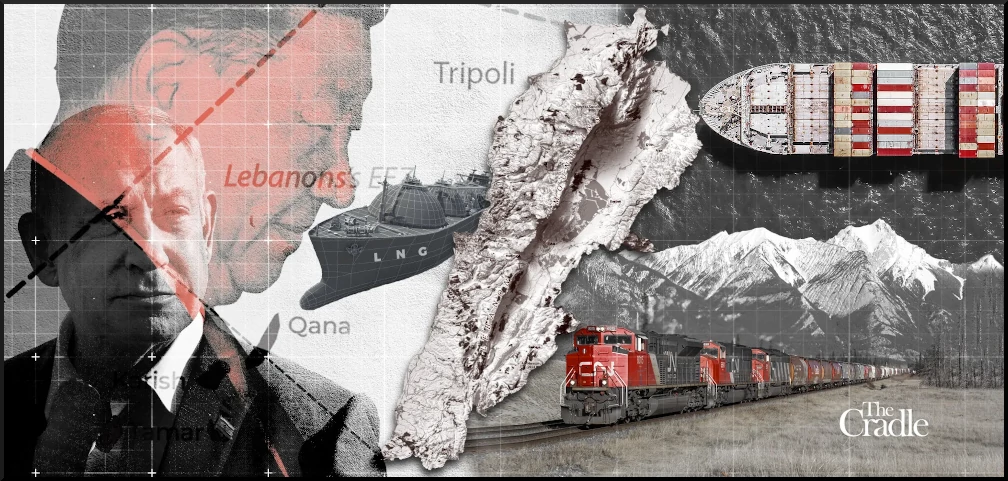by Mohammad Hasan Sweidan, published on The Cradle, October 4, 2023
As only one of two Levantine states flanking the Mediterranean Sea, Lebanon’s geographic location is of great interest to the various road, rail, and waterway connectivity projects emerging in West Asia – not only in connecting the region, but as a bridge between Asia and Europe.
A second look, however, reveals a massive land access problem for Lebanon, which can only be reached via the territories of Syria and Occupied Palestine. Clearly then, for Lebanon to actively participate in West Asian connectivity initiatives, it must establish robust links with either of these two countries.
Following the 1948 Nakba, the Palestine land route had effectively been severed due to Israel’s occupation and regional legislation. In 1954, the League of Arab States drafted a unified law for boycotting Israel, and a year later, Lebanon enacted the Boycott of Israel Law, prohibiting any transactions with Israeli entities. Article 285 of Lebanon’s Penal Code stipulates that:
“Every Lebanese and every person residing in Lebanon shall be punished by imprisonment for at least one year and subject to a fine, or who attempts to enter directly or through a borrowed person into a commercial transaction or any purchase.”
Syria: Lebanon’s only land access
While Palestine is not a practical or feasible option for the time being, Syria remains Lebanon’s only territorial means for the import and export of goods. However, more than a decade of conflict in Syria, persisting foreign occupation of its territories, and US-imposed Caesar Act sanctions have posed immense challenges to historic Lebanese-Syrian political and economic relations.
Lebanon’s primary land access to the entire Arab region lies through Syria, and historical data reveals the economic significance of the Syrian transit route for Lebanese goods. Before the 2011 onset of the foreign-backed war, over 25 percent of exports and nearly 24 percent of imports passed through Syrian territory, with significantly lower transportation costs than the equivalent maritime routes.
In the aftermath of the Syrian conflict, Lebanese exports through Syria fell by 30 to 40 percent, contributing to a 12 percent drop in total exports. This decline also affected tourism, causing a 14 to 15 percent decrease in 2012.
Any impartial assessment of Lebanon’s current economic crisis points to an urgent need to reopen its land routes with Syria. This need becomes all the more imperative if Lebanon wishes to be included in the myriad regional connectivity projects already underway or recently initiated.
Following its triumphant return to the Arab League last May, Syria has sought to reengage economically with major global powers like China and Russia, and regional ones in the Persian Gulf. For Beirut to remain isolated from Damascus, as the latter’s relations evolve independently from the west, would mean isolating Lebanon from the entire region.
US “Caesar Act” punishes Lebanon directly
The US sanctions imposed on Syria under the Caesar Act, which came into force in mid-2020, also affect Lebanon. The goal of isolating Syria, Lebanon’s only de facto land corridor, means isolating Lebanon from its Arab surroundings. Washington is fully aware of the ramifications of its Syria sanctions on Lebanon’s economy: despite the magnitude of Lebanon’s energy sector crisis in the past few years, the US still refuses to grant sanction exemptions so that Egyptian gas and Jordanian electricity can flow into Lebanon via Syria.
Confronting such blatantly coercive US measures requires the Lebanese state to take a firm sovereign stance in defense of its national interests and open cooperation initiatives with Syria. Sadly, one of the factors allowing Washington to isolate both Syria and Lebanon is the Lebanese political position itself, which fears confrontation, kicks the proverbial can down the road, and prefers to obey US diktats even if they pose an existential threat to the state.
Moreover, US sanctions prevent major companies and wealthy countries from investing in Syrian infrastructure as part of economic connectivity projects for the West Asian region. Given that any Lebanese participation in new trade corridors means traversing through Syrian territory, the US Caesar sanctions are a frontline obstacle to Lebanon’s participation in all such projects in West Asia.
Regional connectivity projects for Lebanon
In today’s rapidly evolving multipolar world, major powers are seeking efficient and cost-effective transport routes to move goods between not just countries, but continents. Merely being present in the Eastern Mediterranean is insufficient; Lebanon must ensure cost-effective transport to and from its ports, which necessitates direct cooperation with Damascus.
As things stand, there are several transportation corridors Lebanon can potentially join. One is the Iraqi Dry Canal, connecting the port of Faw in Basra to the Turkish and Syrian borders, set to link the Persian Gulf to Europe. Lebanon could participate by facilitating goods transportation through its ports.
Another ambitious project is the extensive railway connecting Iran, Iraq, Syria, and potentially Jordan and Saudi Arabia, ultimately linking the Persian Gulf to the eastern Mediterranean.
Additionally, Lebanon has a unique opportunity to align local connectivity projects with China’s Belt and Road Initiative (BRI), which Beirut joined in 2017. The country’s strategic location on a major waterway bridging Asia and Europe offers significant value to Beijing’s global economic vision, making Lebanon an attractive partner for BRI projects in the Levant.
China’s willingness to cooperate with this part of the Levant was evident during Syrian President Bashar al-Assad’s September visit to Beijing, where the two states emphasized shared development opportunities. Damascus joined the BRI in January 2022, in defiance of US efforts to sanction and isolate the Syrian government. Today, Lebanon can seize this chance to enhance its presence under China’s regional radar.
Ahead of the upcoming Third BRI Forum, China’s Ambassador to Lebanon, Qian Minjian, told Al-Mayadeen last month that Beijing will work to strengthen the convergence between the BRI and its development plan in Lebanon.
Export challenges: Pipeline dependency
In light of increased normalization between Israel, and Arab monarchies, some in Lebanon have advocated for striking their own deal with the occupation state, but completely neglect the practical economic benefits of connecting with Syria instead. Any Lebanese focus on the India-Middle East-Europe Economic Corridor (IMEC), which includes Israel, serves Washington’s interests rather than Lebanon’s urgent economic needs.
On 16 August, Lebanon’s caretaker Minister of Public Works Ali Hamie announced the arrival of an oil and gas exploration vessel in Lebanon’s offshore Block 9. At the time, it was reported that results of the drilling were expected within two to three months.
While it typically takes several years to extract oil and gas and transition into an energy-exporting country, it is crucial that Beirut begins to plan the transportation routes required to deliver Lebanon’s energy exports to market. Lebanon faces a challenge in this regard, as pipeline projects for exporting Eastern Mediterranean gas to Europe involve Israel and are, therefore, not a viable option.
Beirut is left with two possible alternatives. The first involves exporting liquefied natural gas (LNG) via ships departing from Lebanese fields or liquefaction platforms to facilities in Egypt, Cyprus, Turkiye, and subsequently to Europe.
This proposition will significantly raise the cost of Lebanese gas because of the expense involved in establishing gas liquefaction stations. Additionally, shipping gas by sea is comparatively expensive to land routes, with costs varying according to the distance between exporter and importer.
In general, countries tend to favor gas transportation via pipelines due to lower costs. Russia’s influence over Europe’s energy sector, for instance, was bolstered by its extensive pipeline network, which delivered gas to various European countries.
Energy link to Europe
Over the years, the EU has greatly benefited from this cheap source of gas. Transitioning to LNG will take a significant toll on the European economy, and, crucially, its energy security.
Hence, Beirut’s best option remains a territorial energy link extending from Lebanon to Syria, Turkiye, and ultimately to Europe. Lebanon could also establish connections to Iraqi pipelines through Syria, which will provide yet another land route to Europe via Turkiye. This approach would allow Lebanon to export its gas and oil through pipelines, ensuring access to energy sources at minimal costs.
While Israel actively seeks out new routes to export its stolen Palestinian gas, Lebanon has yet to take steps in this direction. In early September, Prime Minister Benjamin Netanyahu announced that a decision regarding the export route for Cypriot and Palestinian gas would be made within the next three to six months. As such, Lebanon needs to work proactively on realistic export routes to avoid missing out on critical revenue-producing opportunities.
Smart diplomacy is the only way forward. As Washington learns its coercion policies are no longer effective and are leading to the increasing alignment of Arab allies with China and Russia, the US is being compelled to offer incentives to halt this trend. This is exemplified by its latest IMEC project, which on paper, provides an alternative to Chinese connectivity initiatives by recruiting another Asian power, India, as a substitute.
Dependent on Damascus
For now, though, Lebanon remains outside this strategy – acting as an unapologetic punching bag for every coercive policy in Washington’s playbook. While many Global South states are beginning to capitalize on the growing Great Power competition to secure what benefits they can, some, like Lebanon, Jordan, and even Iraq, continue to concede their interests to Washington without seeking reciprocal benefits. This lack of political resolution at the top will guarantee Lebanon’s exclusion from most of the highly competitive regional connectivity projects.
Beirut’s political weakness is evident at its very first hurdle: Syria serves as Lebanon’s sole land gateway, and restoring relations with Damascus should be a top Lebanese priority – which it is not. Improved Syria-Lebanon relations can jumpstart their mutually beleaguered economies and benefit the entire region, from the Persian Gulf’s shores to the Mediterranean coastline.
Any glance at West Asia’s current proposed connectivity projects reveals that most of them include Syria. Regrettably, Lebanon has chosen US-imposed isolation over cooperation with Damascus for fear of further American punishments and unilateral sanctions.
As a bridge between Asia and Europe, a politically stable Syria is in West Asia’s best interest, yet illegal US military presence along the Syrian-Iraqi border constitutes a significant impediment to connectivity projects in the region, including those involving Lebanon.
The success of regional trade corridors necessitates concerted efforts to end the US occupation there and reconnect Lebanon with the beating heart of Al-Sham.
 Syria Support Movement solidarity with the Syrian people
Syria Support Movement solidarity with the Syrian people





